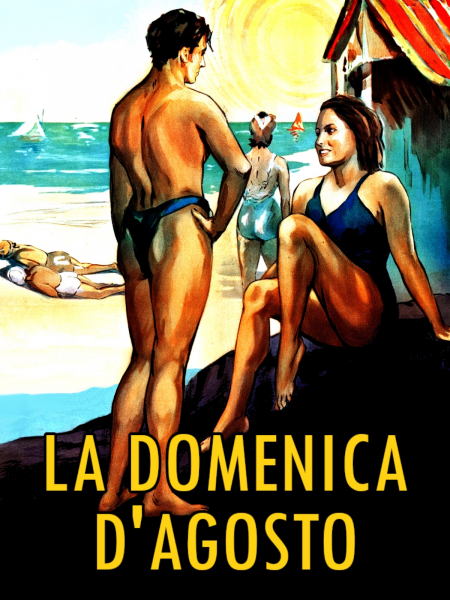In the first program of the year, Monokino helps forget the winter and dream about the summer to come. We do this with two films in which the beach – and everything that happens around it, take the lead role.
COPACABANA BEACH
VIVIAN OSTROVSKY — USA/BR, 1983 – 16MM – 10’
DOMENICA D’AGOSTO
LUCIANO EMMER – IT, 1950 – 35mm naar digitaal – 75’

| 17/03 | 20:00 | KAAP | Oostende |
Shot on Super 8, and transferred to 16mm, Copacabana Beach takes a humorous look at the ritual that takes place every morning on Copacabana’s beach and boardwalk. Brazilian-style fitness, with a touch of soccer and Carmen Miranda. Fun in the sun: where the hectic life gives way to eccentric cheerfulness.
Vivian Ostrovsky (b. 1945) was born in New York, raised in Rio de Janeiro and educated in Paris. She made her first experimental film in 1980 and has since made a vast body of work on Super 8, 16mm, digital film and found footage.
It is a personal oeuvre composed of film diaries and collages, characterized by a dreamy playfulness and humor. Music has an important place in Ostrovsky’s work. Not only in a literal sense, but also symbolically, as the films rock and swing!
The Italian filmmaker Luciano Emmer is unfairly less known to the general public. This is a pity because his films are not inferior to those of contemporaries such as Rossellini, Antonioni, or Fellini. Domenica d’agosto (A Sunday in August) is an example of what Italians call ‘rosy neorealism’. A period at the end of Italian neorealism, where films are more lighthearted, cheerful and more optimistic, without losing sight of social reality. The optimism prevalent in post-war Italian society seeps into several films made roughly between 1950 and 1960.
Everyday Italian society also takes centre stage in Domenica d’agosto. August 7, 1949, to be more precise, a sweltering summer Sunday, where the Roman youths head to Ostia beach by bike, car or overcrowded train to seek some refreshment. A group of posh girlfriends head to a private beach, while the tough working-class guys end up on a messy beach on the outskirts of the city.
When Enrico and Marcella’s paths cross, they forget who – and where they are, and have only eyes for each other. Together, they try to overcome a bumpy road consisting of class differences, hormones, barbed wire and Italians who do not hide their opinions. Unpretentious and full of humour, puppy love – and the drama that comes with it – unfolds on the beaches of Ostia.
With a great love for Italy, youth and film, Emmer mainly cast non-professional actors for his feature debut. Among the five professional actors were Marcello Mastroianni, who plays a traffic cop on duty in Rome, and Franco Interlenghi as the handsome working-class teenager who flirts with Marcella, the girl from a snobby middle-class Roman family.
Tickets are €10 of €7 with discount and for sale via Uit in Oostende. You can contact info@monokino.org for more info.
SUPPORT — Your support is more than welcome and literally brings light to the screen:
BE80 7340 4532 5277 BIC: KREDBEBB
Payment reference: ‘Gift’.
Gifts above the sum of € 40 are tax deductible.
A gift of € 100 will only cost you € 55.
Artistic coordination: Anouk De Clercq, Godart Bakkers
General coordination: Ditte Claus
Artistic team: Eric de Kuyper, Xavier Garcia Bardon
Production team: Bob Mees, Jef Declercq, Johan Opstaele, Noah Heylen
Communication: Cynthia Vandenbruaene
Graphic design: Michaël Bussaer. Webdesign: Dominique Callewaert.
With the support of Auguste Orts, CINEMATEK, KAAP, KASK School of Arts Gent, Onderzoeksfonds Universiteit Gent, Vlaams Audiovisueel Fonds, Vlaamse gemeenschap.

Whoever walks in Ostend today is confronted with a fantastic eclecticism: a brutal grey apartment block exists next to the glorious Thermae Palace. The mighty, almost Stalinist, building of De Grote Post dominates the Hendrik Serruyslaan. A former department store houses a museum for contemporary art. Belle-époque houses are hidden in the quiet but stately streets.
In 2017, one void struck artist Anouk De Clercq: that glorious film culture of Henri Storck, James Ensor or Raoul Servais had disappeared from the streets. With the closure of the Rialto cinema, the last independent cinema from the Ostend cinema circuit also disappeared. Against such an extraordinary backdrop, with the sea as a large projection surface for images, stories and histories, that is such a shame.
And so the idea of Monokino ripens: one room, marked by an equally fantastic eclecticism, where cinema can be itself again. One room where long and short films, film classics, auteur cinema, video art, experimental films, animation, or the work of young makers can find a place. Monokino shows, questions, responds, engages in conversation, invites, welcomes, puts in perspective. Monokino is a place of, by and for people from Ostend, for professionals and enthusiasts, for young and old, for those from here and those from there.
The films that Monokino wants to show don’t only live on the screen. They also spread between residents, spectators, and makers. In that sense, Monokino is also Kopfkino: a mental cinema, where images get the chance to live and multiply.
That’s how Monokino drifts nomadically through those eclectic streets of Ostend and settles in the heads and hearts of the people of Ostend. Soon it’ll moor for good.
Monokino wants to drive cinema into the 21st century and illuminate the adventurous side of film. While we strive for a permanent place as anchorage for cinefiles from Ostend and beyond, Monokino operates as a nomadic film platform.
The sea is Monokino’s favourite projection surface for images, stories and histories. In anticipation of our next screening, we’ve started to collect a list of films in which the sea plays a main or supporting role. Can you think of a film that’s not already on our list? We’d love to hear about it via info@monokino.org.
{{ film.title }}
{{ film.director }} — {{ film.year }}
